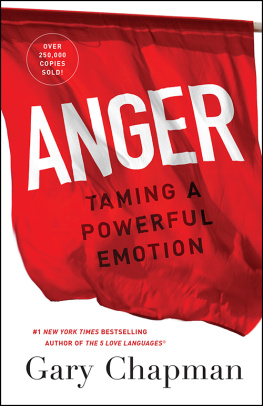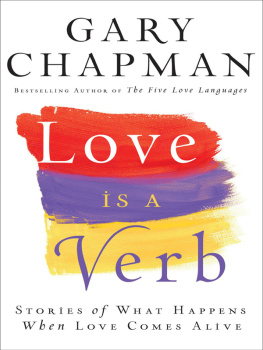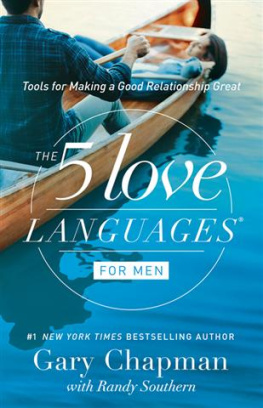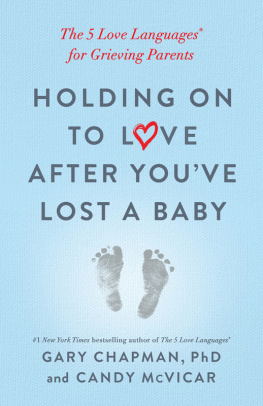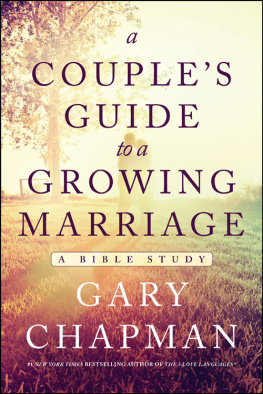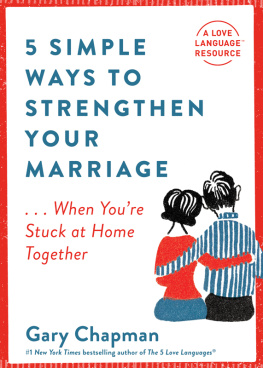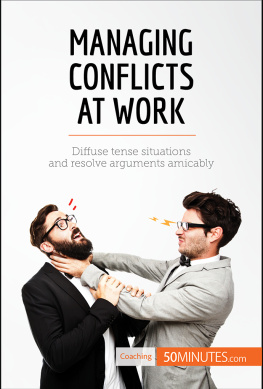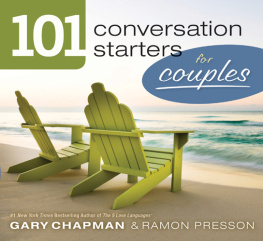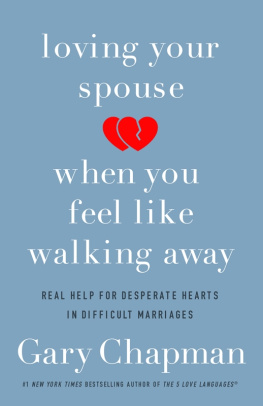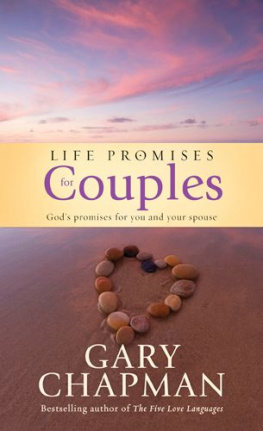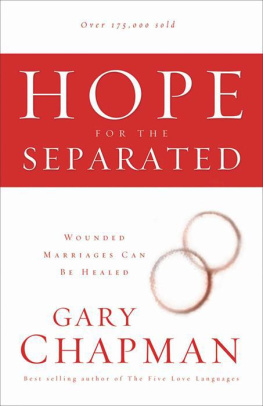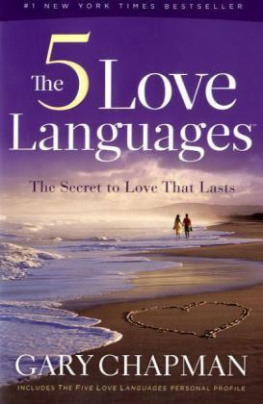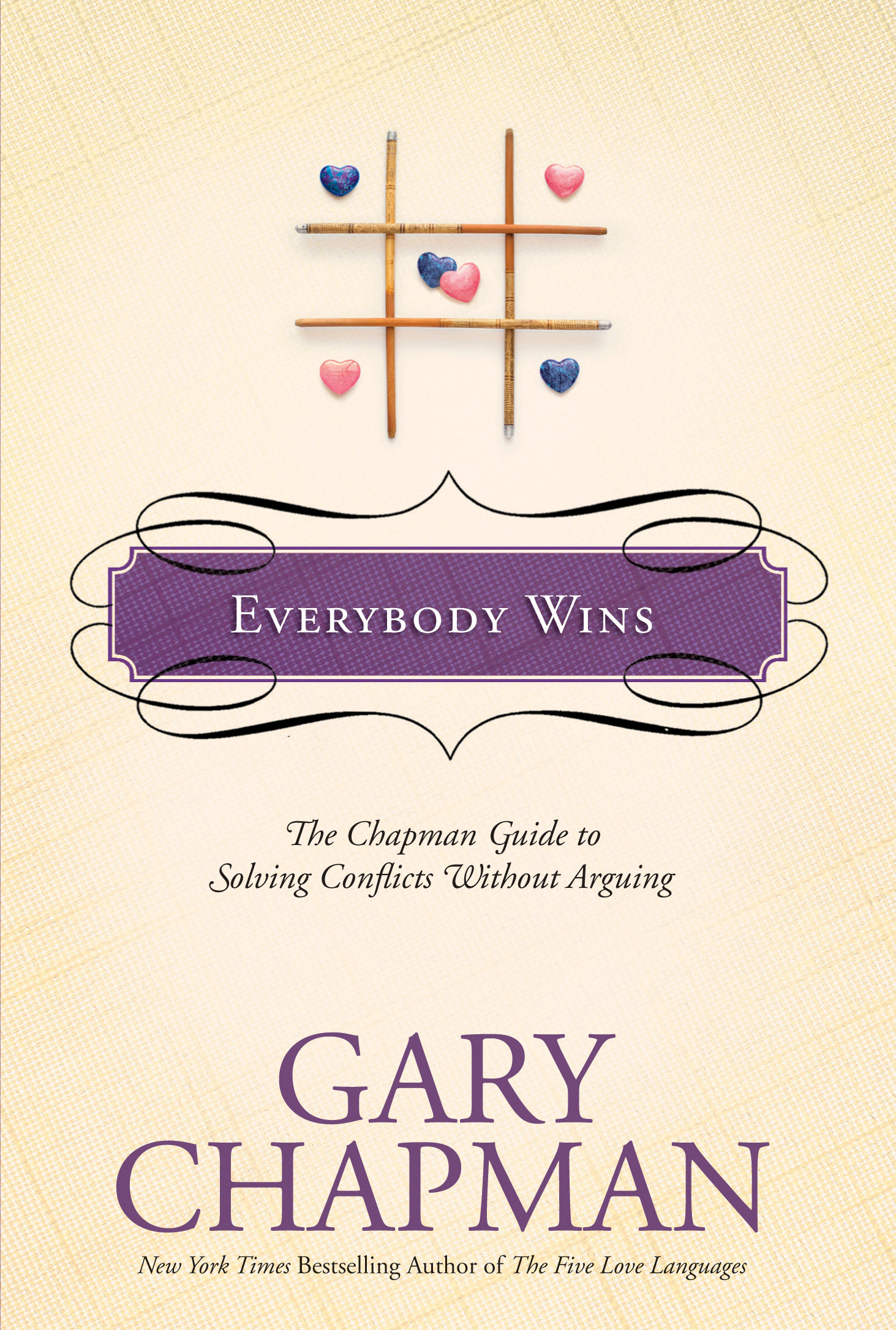Visit Tyndale online at tyndale.com.
Visit Tyndale Momentum online at www.tyndalemomentum.com.
TYNDALE, Tyndale Momentum, and Tyndales quill logo are registered trademarks of Tyndale House Publishers, Inc. The Tyndale Momentum logo is a trademark of Tyndale House Publishers, Inc. Tyndale Momentum is the nonfiction imprint of Tyndale House Publishers, Inc., Carol Stream, Illinois.
Everybody Wins: The Chapman Guide to Solving Conflicts without Arguing
Copyright 2006 by Gary D. Chapman. All rights reserved.
Cover photograph of tic-tac-toe copyright by Darren Baker / iStockphoto.com. All rights reserved.
Cover background image copyright by Lanica Klein. All rights reserved.
Designed by Ron Kaufmann
Edited by Dave Lindstedt
Scripture taken from the Holy Bible, New International Version,NIV. Copyright 1973, 1978, 1984 by Biblica, Inc. Used by permission. All rights reserved worldwide.
For information about special discounts for bulk purchases, please contact Tyndale House Publishers at , or call 1-800-323-9400.
Library of Congress Cataloging-in-Publication Data
Chapman, Gary D., date.
Everybody wins : the Chapman guide to solving conflicts without arguing / Gary D. Chapman.
p. cm.
Includes bibliographical references.
ISBN-13: 978-1-4143-0014-6 (hc : alk. paper)
ISBN-10: 1-4143-0014-X (hc : alk. paper)
1. Marital conflict. 2. Conflict management. 3. Couples Psychology. 4. Married people Psychology. I. Title.
HQ734.C465 2006
646.78 dc22 2006021182
Build: 2021-04-21 14:12:27 EPUB 3.0
I NTRODUCTION
F or more than thirty years, couples have been walking into my office seeking help. Almost without exception, they come in because of unresolved conflicts. They have argued for so long that each knows what the other is going to say. Their arguments have become predictable, but resolution eludes them. Exhausted, they have now come for professional help. However, I often sense that they view me more as a judge than a counselor, secretly hoping that I will pronounce their spouse guilty of illogical thinking and unreasonable demands.
Because I am a counselor and not a judge, I begin the arduous task of listening to their complaints. They review their well-worn speeches for me, certain that I will see the logic of their respective positions. I listen carefully and take notes, but as a counselor, Im not as concerned with logic as I am about relationships. I know that in their hearts they want more than to resolve a disagreement. What they deeply long for is a better relationship. Behind the frustration of unresolved conflicts is the desire for harmony.
Loving relationships are fostered by understanding, not by winning arguments. So I begin to ask a question such as, How do you feel when those words come out of his mouth? or What happens inside you when you hear her make that comment? I listen, take notes, and ask more questions, seeking to discover the feelings that lie beneath the conflicts. No conflict will ever be resolved successfully unless we first understand the underlying feelings.
I also ask couples questions about values: Why is this so important to you? The answer to that question often reveals the values that created a conflict in the first place. If I dont understand their values, I will never comprehend why they feel so strongly about the issues. As a counselor, I am doing for these couples what they have never learned to do for themselves. I am seeking to understand them. Understanding fosters resolution and harmony.
When I did the research for my book The Four Seasons of Marriage, I encountered hundreds of couples who admitted to having a winter marriage; that is, their marriages were characterized by anger, disappointment, loneliness, negativity, discouragement, frustration, and hopelessness. Their relationships were detached, cold, harsh, and bitter. They felt alone and betrayed. They had hunkered down in the igloo and hoped for spring, but for many, spring never came.
Almost all of these couples started their marriages in spring. They had great visions of a happy life together. They intended to make their spouse supremely happy. Life would be beautiful. But some of these couples went straight from spring to winter, skipping summer and fall altogether. Others could look back on a former season in their marriages when the flowers bloomed and the sun was shining. Now they have to admit that the flowers have been dead for a long time.
What brought these couples from the anticipation of spring to the harshness of winter in their marriage relationships? Almost without exception, the process involved unresolved conflicts. Differences emerged, and some of these differences became divisive. The couples had no training in how to resolve conflicts, so they ended up trying to convince their spouse of the validity of their own perspective by means of carefully worded arguments. When the arguments were unconvincing, they repeated them with more intensity and blamed their spouse for being illogical and unreasonable. Eventually, tired of arguing, they withdrew from each other, and the coldness of winter settled over the marriage.
Couples have conflicts in all four seasons of marriage. Those who learn to resolve their conflicts spend more time in spring and summer. Those who fail to resolve conflicts inevitably drift to a fall or winter marriage. These unresolved conflicts create a sense of hopelessness for many couples. They see only two options: remain in the marriage and be miserable, or dissolve the marriage and hope that somewhere in the future they will find someone with whom they are more compatible. Those who choose the latter option fail to realize that no marriage is without conflict.
I believe there is a third option: Couples who learn how to resolve their conflicts without arguing turn the coldness of winter to the hope and promise of spring. Whatever the season of your marriage spring, summer, fall, or winter I believe that your relationship will be strengthened if you can learn the art of resolving conflicts in a positive way.
In this short book, my objective is to help you learn how to understand your spouse so that you can resolve conflicts rather than simply win (or lose) arguments. When you win an argument, your spouse is the loser. And we all know its no fun to live with a loser. When you resolve a conflict, you and your spouse both win and your friendship is strengthened. Good marriages are based on friendship, not on winning arguments.
I wrote this book for the thousands of couples who will never seek the services of a professional counselor but who would desperately like to learn how to resolve conflicts. I have chosen to write in the language of everyday life, not with highly technical terminology or lofty theological concepts. My desire is that this book will enhance the quality of your marriage by teaching you how to resolve conflicts without arguing.
The four seasons of marriage refer to the climate within a marriage relationship, not the season of life a couple is in or the literal season in which they were married. As I explain in the book The Four Seasons of Marriage, the natural seasons of the year provide us with an apt analogy for the changes that occur in a marriage relationship.
1 W HATS S O B AD ABOUT A RGUING?
L ets start at the beginning. In the dating phase of your relationship, chances are that you and your spouse were enamored with each other. You liked what you saw. You enjoyed spending time together. You could talk for hours. He or she was the most wonderful person you could imagine. In short, you were smitten. The courtship may have been long or short, but your positive feelings led you to the marriage altar, where you made a commitment for better, for worse; for richer, for poorer; in sickness and in health; to love and to cherish, so long as we both shall live. The promises you made to each other were colossal, but at the time you fully intended to keep them. You were caught up in the current of love and it all seemed so effortless. You knew that you and your mate had differences, but you never thought that someday those differences would become divisive.


